The industrial control network modules market is forecasted to grow from USD 164.0 million in 2025 to USD 249.8 million by 2035, adding USD 85.8 million in new value and expanding at a 4.3% CAGR. Growth is driven by rising Industry 4.0 adoption, expanding industrial automation, and increasing requirements for standardized, secure communication across manufacturing and process environments. Network modules are becoming central to connecting PLCs, HMIs, sensors, controllers, and enterprise systems, enabling real-time data exchange, predictive maintenance, and coordinated control across production lines and building systems.
Ethernet-based modules lead with 63.4% market share in 2025, reflecting the shift toward high-speed, plant-wide connectivity and support for Ethernet/IP, Profinet, and Modbus TCP protocols. Fieldbus modules retain relevance in process industries, while wireless network modules grow in applications requiring mobility, remote monitoring, or flexible equipment layouts. By application, building automation is the largest segment at 41.2%, influenced by smart infrastructure and energy-efficient facility management initiatives. Manufacturing companies represent the dominant end-user group with a 52.7% share, as factories modernize and integrate distributed control systems. Regionally, the highest growth is concentrated in Asia Pacific, led by China (5.8% CAGR) and India (5.4% CAGR), where industrial digitalization and factory expansion continue to accelerate. Major players shaping the competitive landscape include Honeywell, Schneider Electric, and Johnson Controls, leveraging integrated automation portfolios and long-standing industrial relationships.
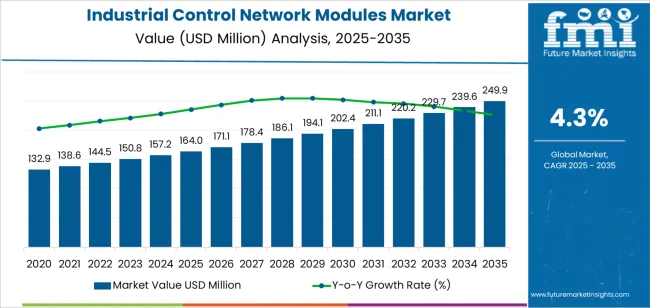
Production capabilities are advancing through specialized electronics manufacturing technologies and automated assembly systems that enable precise quality control while reducing manufacturing costs. Leading manufacturers are investing in advanced surface-mount technology equipment and embedded software development to create network modules that deliver superior data transmission rates, extended operational reliability, and consistent performance under demanding industrial conditions. Industrial equipment suppliers and automation system integrators are expanding their network module offerings to address specific communication requirements across process industries, discrete manufacturing, and infrastructure automation applications.
Quality standards continue evolving as applications demand higher cybersecurity specifications and consistent performance under extreme operating environments including electromagnetic interference, temperature fluctuations, and prolonged service cycles. Industry certification programs and testing protocols ensure reliable product performance while supporting market confidence in industrial network technology adoption across critical manufacturing processes and regulated industrial environments. Compliance requirements for industrial communication standards and cybersecurity applications are driving investments in comprehensive validation systems and security verification procedures throughout the manufacturing supply chain.
International manufacturing coordination is supporting market development as major industrial projects require standardized communication solutions across multiple production facilities. Global manufacturing companies are establishing unified specifications for industrial network protocols that influence worldwide procurement standards and create opportunities for specialized network module manufacturers. Industrial engineering firms are forming partnerships with automation system suppliers to develop application-specific communication solutions tailored to emerging digitalization requirements and industrial equipment specifications.
Investment patterns are shifting toward integrated system solutions as manufacturing facilities seek comprehensive industrial communication networks that combine advanced protocol support with cybersecurity features and maintenance-friendly characteristics. Industrial companies are implementing standardized network specifications across their facilities, while equipment manufacturers are incorporating advanced network module technology into their automation system designs to ensure communication reliability and operational efficiency. This trend toward standardization and protocol optimization is reshaping competitive dynamics across the industrial automation components value chain.
Market maturation is evident in the emergence of specialized application segments that demand unique communication characteristics and protocol specifications. Process industry applications require explosion-proof module configurations and hazardous area certifications under strict safety requirements, while discrete manufacturing systems need modules that maintain performance during high-speed data exchange and provide consistent communication reliability in automated production environments. These specialized requirements are driving innovation in embedded software, protocol conversion technologies, and integration methodologies that extend beyond traditional industrial communication applications.
| Metric | Value |
|---|---|
| Market Value (2025) | USD 164.0 million |
| Market Forecast Value (2035) | USD 249.8 million |
| Forecast CAGR (2025-2035) | 4.3% |
| INDUSTRIAL DIGITALIZATION | AUTOMATION EXPANSION | COMMUNICATION STANDARDIZATION |
|---|---|---|
| Industry 4.0 Implementation - Manufacturing facilities implementing comprehensive digitalization strategies requiring advanced network modules for data integration, real-time monitoring, and automated decision-making processes across production systems, quality control applications, and facility management with enhanced communication protocols and cybersecurity features for industrial operations. | Process Automation Growth - Industrial facilities expanding automated control systems requiring specialized network modules for programmable logic controllers, distributed control systems, and supervisory control applications with reliable data transmission capabilities for manufacturing optimization, process efficiency, and operational safety requirements. | Protocol Integration - Industrial communication standardization initiatives requiring network modules capable of supporting multiple protocols including Ethernet/IP, Profinet, and Modbus TCP for seamless integration across diverse automation equipment, control systems, and enterprise networks with enhanced interoperability and reduced implementation complexity. |
| Smart Manufacturing - Advanced manufacturing systems requiring integrated network modules for machine-to-machine communication, predictive maintenance applications, and production data analytics with comprehensive connectivity solutions supporting real-time control, process optimization, and quality assurance throughout industrial operations. | Control System Modernization - Industrial facility upgrades requiring network modules for legacy system integration, communication protocol conversion, and distributed control architecture with enhanced performance and reliability characteristics for critical manufacturing processes and infrastructure applications. | Enterprise Integration - Manufacturing execution systems requiring network modules for plant-wide data exchange, enterprise resource planning connectivity, and business intelligence applications with standardized communication protocols supporting operational efficiency and decision-making processes. |
| IoT Integration - Industrial Internet of Things applications requiring network modules for sensor connectivity, edge computing support, and cloud-based analytics integration with advanced data processing capabilities and secure communication protocols for comprehensive facility monitoring and optimization. | Infrastructure Automation - Utilities and infrastructure operators implementing network modules for remote monitoring, distributed control applications, and automated system management with reliable communication capabilities supporting operational efficiency and system reliability requirements. | Cybersecurity Requirements - Industrial communication security standards requiring network modules with advanced encryption capabilities, secure authentication protocols, and comprehensive threat protection for critical infrastructure applications and sensitive manufacturing processes. |
| Category | Segments / Values |
|---|---|
| By Type | Ethernet-based Modules; Fieldbus Modules; Wireless Network Modules; Serial Communication Modules; Others |
| By Application | Building Automation; Energy Management; Chemical Processing; Food & Beverage; Oil & Gas; Water Treatment; Others |
| By End-User | Manufacturing Companies; System Integrators; Industrial Equipment Suppliers; Engineering Contractors; Utilities; Others |
| By Protocol | Ethernet/IP; Profinet; Modbus TCP; DeviceNet; AS-Interface; CAN Bus; Others |
| By Installation | Panel Mount; DIN Rail Mount; Embedded Modules; Standalone Units; Others |
| By Region | North America; Europe; Asia Pacific; Latin America; Middle East & Africa |
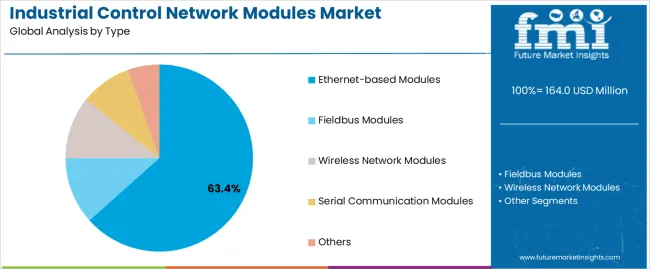
| Segment | 2025-2035 Outlook |
|---|---|
| Ethernet-based Modules |
|
| Fieldbus Modules |
|
| Wireless Network Modules |
|
| Others |
|
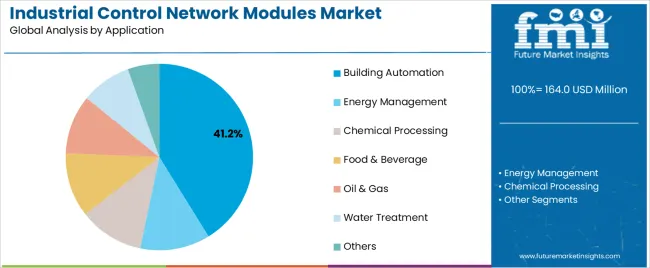
| Segment | 2025-2035 Outlook |
|---|---|
| Building Automation |
|
| Energy Management |
|
| Chemical Processing |
|
| Others |
|
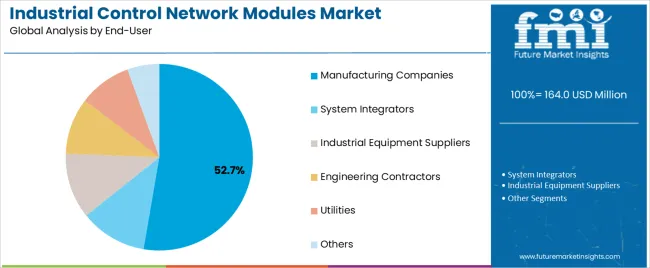
| End-User | Status & Outlook (2025-2035) |
|---|---|
| Manufacturing Companies |
|
| System Integrators |
|
| Industrial Equipment Suppliers |
|
| Others |
|
| KEY TRENDS | DRIVERS | RESTRAINTS |
|---|---|---|
| Protocol Convergence - Industrial communication protocols consolidating toward Ethernet-based standards with Time-Sensitive Networking capabilities enabling unified network architectures that support both control and information technology applications with enhanced deterministic performance, reduced infrastructure complexity, and comprehensive security features for modern manufacturing environments. | Industry 4.0 Adoption - Manufacturing digitalization initiatives creating substantial demand for network modules supporting machine connectivity, data analytics integration, and real-time decision-making processes across production systems requiring advanced communication capabilities and cybersecurity features for competitive manufacturing operations. | Cybersecurity Complexity in industrial networks creating challenges for network module deployment and management across facilities lacking specialized IT expertise and comprehensive security protocols, limiting adoption of advanced connectivity solutions in traditional manufacturing environments with established operational procedures. |
| Edge Computing Integration - Network modules incorporating edge processing capabilities and local data analytics supporting distributed intelligence applications that reduce network bandwidth requirements while enabling real-time control decisions and predictive maintenance capabilities throughout industrial facilities. | Regulatory Compliance - Industrial safety standards and communication protocol requirements driving adoption of certified network modules for hazardous area applications, process safety systems, and critical infrastructure operations requiring documented performance validation and comprehensive security protocols. | Integration Complexity - Diverse industrial protocols, legacy system compatibility requirements, and multi-vendor environments creating technical challenges for network module deployment across facilities with established automation infrastructure and limited technical resources for comprehensive system integration. |
| Wireless Technology Advancement - Industrial wireless communication technologies including 5G, Wi-Fi 6, and specialized industrial wireless protocols enabling flexible network architectures and mobile equipment connectivity with enhanced reliability, security, and deterministic performance characteristics for demanding industrial applications. | Infrastructure Modernization - Industrial facility upgrades and automation system enhancements requiring network modules for improved communication reliability, enhanced data throughput, and comprehensive system integration supporting operational efficiency and maintenance optimization throughout manufacturing operations. | Cost Sensitivity in industrial procurement and budget constraints limiting adoption of premium network solutions across cost-conscious manufacturing facilities and competitive industrial applications with restricted capital equipment budgets and extended payback requirements. |
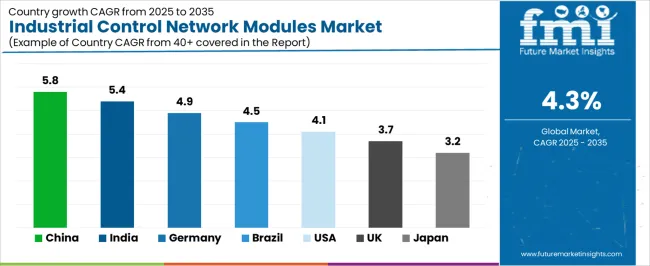
| Country | CAGR (2025-2035) |
|---|---|
| China | 5.8% |
| India | 5.4% |
| Germany | 4.9% |
| Brazil | 4.5% |
| United States | 4.1% |
| United Kingdom | 3.7% |
| Japan | 3.2% |
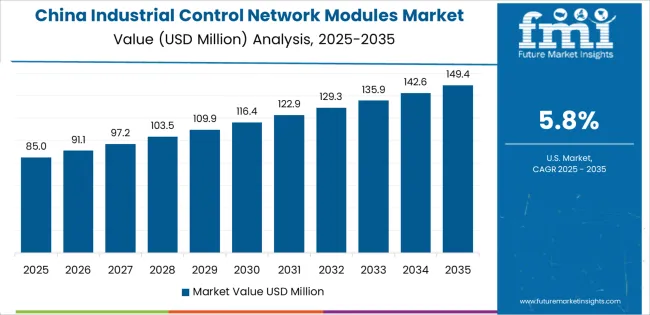
China is projected to exhibit strong growth with a market value of USD 61.2 million by 2035, driven by extensive manufacturing modernization programs and comprehensive industrial digitalization initiatives creating substantial opportunities for network technology suppliers across automation system installations, smart factory projects, and industrial facility development sectors. The country's ambitious manufacturing upgrade programs including national Industry 4.0 initiatives and automated production facility expansion are creating consistent demand for specialized industrial network modules. Major manufacturing companies and industrial equipment suppliers including Sany Group, China National Machinery Industry Corporation, and specialized automation component manufacturers are establishing comprehensive network solution programs to support large-scale industrial production and advanced manufacturing technology applications.
India is expanding to reach USD 18.7 million by 2035, supported by extensive manufacturing industry development programs and comprehensive industrial infrastructure modernization initiatives creating demand for network solutions across diverse manufacturing facility and automation system application segments. The country's growing industrial manufacturing capabilities and expanding automation infrastructure are driving demand for network components that provide exceptional reliability while supporting advanced manufacturing system requirements. Industrial companies and manufacturing facilities are investing in network technology to support growing production demand and industrial automation advancement requirements.
Germany is projected to reach USD 27.3 million by 2035, supported by the country's leadership in industrial engineering technology and advanced manufacturing systems requiring sophisticated network solutions for precision manufacturing and industrial automation applications. German manufacturing operators are implementing cutting-edge network platforms that support advanced operational capabilities, precision performance, and comprehensive quality monitoring protocols. The market is characterized by focus on engineering excellence, technology innovation, and compliance with stringent industrial safety and performance standards.
Brazil is growing to reach USD 12.8 million by 2035, driven by industrial infrastructure development programs and increasing manufacturing capabilities creating opportunities for network suppliers serving both industrial manufacturers and specialized equipment contractors. The country's expanding manufacturing sector and growing industrial infrastructure are creating demand for network components that support diverse manufacturing requirements while maintaining performance standards. Industrial companies and manufacturing facilities are developing technology strategies to support operational efficiency and system reliability advancement.
The United States is projected to reach USD 23.1 million by 2035, expanding at a CAGR of 4.1%, driven by advanced manufacturing technology innovation and specialized industrial applications supporting precision manufacturing and comprehensive automation technology applications. The country's established manufacturing technology tradition including major industrial equipment manufacturers and automation facilities are creating demand for high-performance network components that support operational advancement and cybersecurity standards. Manufacturers and industrial system suppliers are maintaining comprehensive development capabilities to support diverse manufacturing and automation requirements.
The United Kingdom is growing to reach USD 15.9 million by 2035, supported by manufacturing technology heritage and established industrial engineering communities driving demand for premium network solutions across traditional manufacturing systems and specialized industrial automation applications. The country's rich industrial engineering heritage including major manufacturing companies and established industrial system capabilities create demand for network components that support both legacy system advancement and modern manufacturing applications.
Japan is projected to reach USD 14.6 million by 2035, driven by precision manufacturing technology tradition and established industrial leadership supporting both domestic manufacturing system markets and export-oriented component production. Japanese companies maintain sophisticated network development capabilities, with established manufacturers continuing to lead in connectivity technology and industrial equipment standards.

European industrial control network module operations are increasingly concentrated between German engineering excellence and specialized manufacturing across multiple countries. German facilities dominate high-performance network production for precision manufacturing and industrial automation applications, leveraging cutting-edge manufacturing technologies and strict quality protocols that command price premiums in global markets. British manufacturing technology operators maintain leadership in industrial system innovation and network development, with organizations like specialized engineering companies and university research centers driving technical specifications that suppliers must meet to access major industrial contracts.
Eastern European operations in Czech Republic and Poland are capturing specialized production contracts through precision manufacturing expertise and EU compliance standards, particularly in component fabrication and assembly technologies for industrial applications. These facilities increasingly serve as development partners for Western European manufacturing programs while building their own industrial technology expertise.
The regulatory environment presents both opportunities and constraints. European industrial safety framework requirements create quality standards that favor established European manufacturers and industrial system operators while ensuring consistent performance specifications for critical manufacturing infrastructure and safety applications. Brexit has created complexity for UK manufacturing collaboration with EU programs, driving opportunities for direct relationships between British operators and international network suppliers.
Technology collaboration accelerates as manufacturing companies seek technology advancement to support major industrial modernization milestones and digitalization development timelines. Vertical integration increases, with major industrial system operators acquiring specialized manufacturing capabilities to secure component supplies and quality control for critical manufacturing programs. Smaller industrial contractors face pressure to specialize in niche applications or risk displacement by larger, more comprehensive operations serving mainstream manufacturing and automation requirements.
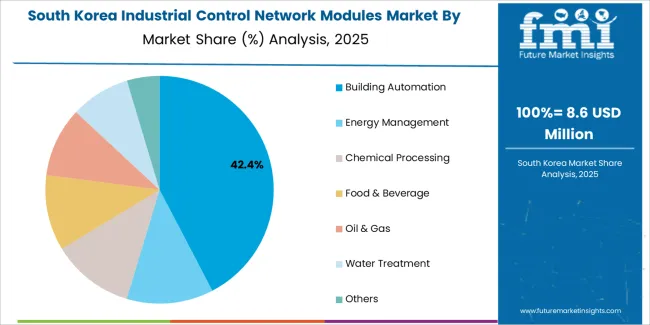
South Korean industrial control network module operations reflect the country's advanced manufacturing technology capabilities and export-oriented industrial development model. Major industrial system operators including Samsung Engineering and technology companies drive component procurement strategies for their manufacturing facilities, establishing direct relationships with specialized network suppliers to secure consistent quality and performance for their industrial development programs and advanced manufacturing technology systems targeting both domestic infrastructure and international collaboration projects.
The Korean market demonstrates particular strength in integrating network technologies into automated manufacturing platforms and advanced industrial system configurations, with engineering teams developing solutions that bridge traditional manufacturing communication applications and next-generation industrial systems. This integration approach creates demand for specific performance specifications that differ from conventional applications, requiring suppliers to adapt network capabilities and system coordination characteristics.
Regulatory frameworks emphasize industrial safety and manufacturing system reliability, with Korean industrial standards often exceeding international requirements for network systems. This creates barriers for standard component suppliers but benefits established manufacturers who can demonstrate industrial-grade performance capabilities. The regulatory environment particularly favors suppliers with Korean manufacturing system qualification and comprehensive testing documentation systems.
Supply chain excellence remains critical given Korea's manufacturing focus and international collaboration dynamics. Industrial system operators increasingly pursue development partnerships with suppliers in Japan, Germany, and specialized manufacturers to ensure access to cutting-edge network technologies while managing infrastructure risks. Investment in industrial infrastructure supports performance advancement during extended manufacturing development cycles.
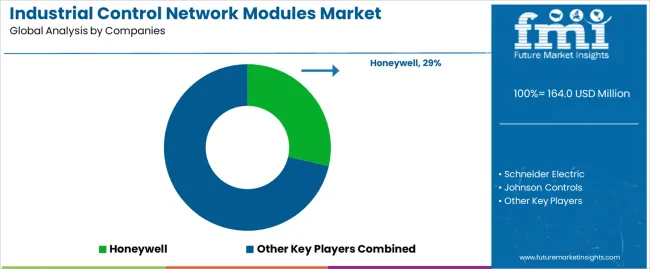
Honeywell leads the market with 28.6% share owing to its comprehensive industrial automation portfolio and established manufacturing relationships, which facilities use to implement integrated network solutions across diverse automation applications. Profit pools are consolidating upstream in advanced protocol development and downstream in application-specific solutions for industrial automation, building management integration, and specialized manufacturing markets where communication reliability, cybersecurity features, and consistent data transmission command substantial premiums. Value is migrating from basic network component production to specification-driven, application-ready automation systems where protocol expertise, precision manufacturing, and reliable integration capabilities create competitive advantages.
Several archetypes define market leadership: established American technology companies defending share through comprehensive automation system development and proven industrial integration support; German engineering suppliers leveraging manufacturing excellence and technical capabilities; European automation leaders with building management expertise and precision manufacturing heritage; and emerging Asian manufacturers pursuing cost-effective production while developing advanced communication capabilities.
Switching costs - system integration, protocol compatibility validation, industrial certification - provide stability for established suppliers, while technological advancement requirements and specialized application growth create opportunities for innovative component manufacturers. Consolidation continues as companies seek manufacturing scale; direct industrial partnerships grow for specialized applications while traditional automation distribution remains relationship-driven. Focus areas: secure premium manufacturing and industrial automation market positions with application-specific performance specifications and technical collaboration; develop network technology and advanced manufacturing capabilities; explore specialized applications including process industries and infrastructure automation requirements.
| Stakeholder Type | Primary Advantage | Repeatable Plays |
|---|---|---|
| American Technology Leaders | Comprehensive automation expertise; proven industrial integration; established manufacturer relationships | Technology innovation; industrial partnerships; cybersecurity focus |
| German Engineering Suppliers | Manufacturing excellence; comprehensive automation development programs; established customer partnerships | Engineering collaboration focus; integrated solutions; technical consultation |
| European Automation Companies | Building management expertise; precision technology leadership; trusted by major industrial programs | Industrial partnerships; application-specific specifications; infrastructure collaboration |
| Emerging Asian Producers | Manufacturing efficiency; competitive pricing; rapid technology development | Production scaling; protocol advancement; market entry strategies |
| Industrial Distributors | Technical distribution networks; manufacturing service relationships | Industrial expertise; inventory management; technical support services |
| Item | Value |
|---|---|
| Quantitative Units | USD 164.0 million |
| Type Segments | Ethernet-based Modules; Fieldbus Modules; Wireless Network Modules; Serial Communication Modules; Others |
| Applications | Building Automation; Energy Management; Chemical Processing; Food & Beverage; Oil & Gas; Water Treatment; Others |
| End-Users | Manufacturing Companies; System Integrators; Industrial Equipment Suppliers; Engineering Contractors; Utilities; Others |
| Protocol Segments | Ethernet/IP; Profinet; Modbus TCP; DeviceNet; AS-Interface; CAN Bus; Others |
| Installation Types | Panel Mount; DIN Rail Mount; Embedded Modules; Standalone Units; Others |
| Regions Covered | North America; Latin America; Europe; Asia Pacific; Middle East & Africa |
| Key Countries | China; India; Germany; Brazil; United States; United Kingdom; Japan (+35 additional countries) |
| Key Companies Profiled | Honeywell; Schneider Electric; Johnson Controls; Rockwell Automation; Mitsubishi Electric; Siemens; Phoenix Contact; ABB; Emerson; Omron; Yokogawa; Eaton; Beckhoff; Weidmüller; Pepperl+Fuchs; Balluff; Turck; IFM Electronic |
| Additional Attributes | Dollar sales by type and application; Regional demand trends (NA, EU, APAC); Competitive landscape; Manufacturing vs. aftermarket adoption patterns; Industrial automation and building management integration; Advanced protocol innovations driving performance enhancement, cybersecurity reliability, and industrial communication excellence |
The global industrial control network modules market is estimated to be valued at USD 164.0 million in 2025.
The market size for the industrial control network modules market is projected to reach USD 249.9 million by 2035.
The industrial control network modules market is expected to grow at a 4.3% CAGR between 2025 and 2035.
The key product types in industrial control network modules market are ethernet-based modules, fieldbus modules, wireless network modules, serial communication modules and others.
In terms of application, building automation segment to command 41.2% share in the industrial control network modules market in 2025.






Full Research Suite comprises of:
Market outlook & trends analysis
Interviews & case studies
Strategic recommendations
Vendor profiles & capabilities analysis
5-year forecasts
8 regions and 60+ country-level data splits
Market segment data splits
12 months of continuous data updates
DELIVERED AS:
PDF EXCEL ONLINE
Industrial Sand Mill Market Size and Share Forecast Outlook 2025 to 2035
Industrial Precision Oven Market Size and Share Forecast Outlook 2025 to 2035
Industrial Water Chiller for PCB Market Size and Share Forecast Outlook 2025 to 2035
Industrial & Commercial HVLS Fans Market Size and Share Forecast Outlook 2025 to 2035
Industrial Wired Routers Market Size and Share Forecast Outlook 2025 to 2035
Industrial Evaporative Condensers Market Size and Share Forecast Outlook 2025 to 2035
Industrial Energy Management System Market Size and Share Forecast Outlook 2025 to 2035
Industrial Insulation Market Size and Share Forecast Outlook 2025 to 2035
Industrial Safety Gloves Market Size and Share Forecast Outlook 2025 to 2035
Industrial Cleaner Market Size and Share Forecast Outlook 2025 to 2035
Industrial Dust Treatment System Market Size and Share Forecast Outlook 2025 to 2035
Industrial Vertical Washing Tower Market Size and Share Forecast Outlook 2025 to 2035
Industrial Pepper Market Size and Share Forecast Outlook 2025 to 2035
Industrial Electronics Packaging Market Forecast and Outlook 2025 to 2035
Industrial Absorbent Market Forecast and Outlook 2025 to 2035
Industrial Furnace Industry Analysis in Europe Forecast and Outlook 2025 to 2035
Industrial Denox System Market Size and Share Forecast Outlook 2025 to 2035
Industrial Electronic Pressure Switch Market Size and Share Forecast Outlook 2025 to 2035
Industrial WiFi Module Market Size and Share Forecast Outlook 2025 to 2035
Industrial Security System Market Forecast Outlook 2025 to 2035

Thank you!
You will receive an email from our Business Development Manager. Please be sure to check your SPAM/JUNK folder too.
Chat With
MaRIA